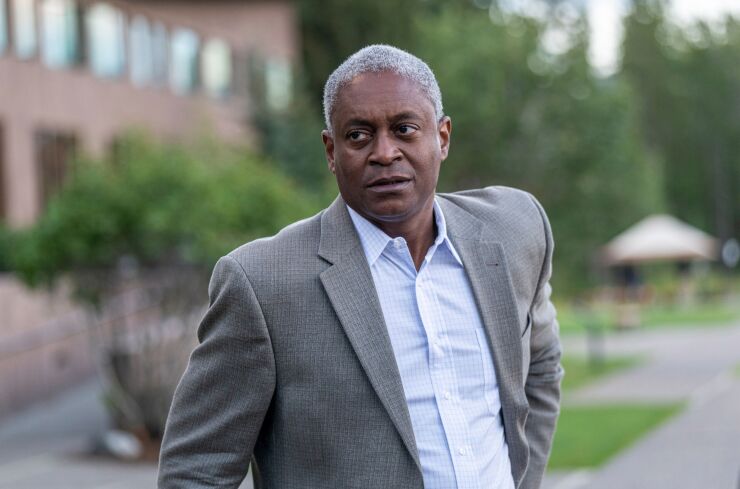
Federal Reserve Bank of Atlanta President Raphael Bostic disclosed having made prohibited personal trades last year.
Bostic said his account managers executed nine sales and 10 purchases on his behalf on May 2, 2022, one day before the Federal Open Market Committee was set to meet. Fed officials are prohibited from engaging in trades for the nearly two week "blackout period" prior to an FOMC meeting.
Bostic disclosed the prohibited trades in his annual financial statement, which was released Thursday afternoon. He said he was not aware that the transactions, which were executed by investment managers for his husband's retirement account, were subject to the blackout rule.
"As I now understand, transactions in such accounts are not exempt from the reporting requirements and FOMC blackout period trading restrictions," Bostic wrote. "The transactions that occurred on May 2, 2022, were associated with funds invested through one such account and occurred prior to realizing that they were subject to blackout restrictions."
Bostic also disclosed a litany of other issues with his 2021 disclosure that he recognized while completing the form for 2022. These included writing down incorrect values for certain assets, omitting assets he owned and including assets he'd already sold. He also listed rental properties in California, Utah and the Virgin Islands twice.
This is not the first time Bostic has had issues with his disclosure statements. Last fall, he owned up to failing to disclose more than $50,000 of U.S. Treasury holdings in the prior year's financial disclosure.
All 12 regional reserve banks published the financial statements for the presidents on Thursday afternoon, including the Kansas City Fed and the Chicago Fed, which released reports for Esther George and Charles Evans, both of whom retired in January. Austan Goolsbee, who replaced Evans as the head of the Chicago Fed, also released a statement.
The reports include assets, liabilities, income sources, positions held outside the Federal Reserve System, arrangements with other organizations, gifts and transactions valued at $1,000 or more.
Financial disclosures by Fed officials have come under heightened scrutiny in recent years following a
Rosengren and Kaplan both initiated stock transactions in the spring of 2020 after being made aware of emergency measures that were to be rolled out by the Board of Governors to support the economy at the onset of the COVID-19 pandemic. After the moves became public on September 9, 2021, both officials pledged to sell the entire stock portfolios to avoid perceived impropriety. Within a month, both had stepped down, with Rosengren citing a worsening kidney condition and Kaplan saying that he did not want to be a "distraction."
The scandal ultimately spread to include Fed Chair Jerome Powell and then-Vice Chair Richard Clarida, but both were cleared of wrongdoing by the Fed's inspector general.
The handling of the ordeal has drawn criticism from politicians, academics and policy advocates who feel the Fed's inspector general is too lenient. Sen. Elizabeth Warren, D-Mass., has been the most
"This is not strong oversight. In fact, it is not even competent oversight," Warren said to Bialek during a congressional hearing last month. "It looks like, to anyone in the public, that you gave your boss a free pass and that's just not going to cut it here."
Still, the ordeal led to several policy changes at the Fed, including a requirement that reserve bank presidents disclose trades within 30 days, a requirement that already applied to members of the Board of Governors. Richmond Fed President Thomas Barkin, for example, has made two such disclosures this year for sales of municipal bonds.
As part of the Fed's policy reform, officials are prohibited from purchasing new individual bonds, stocks, agency securities, cryptocurrencies, commodities or foreign currencies. They also can't enter into derivative contracts, engage in short selling or purchase assets on margin. Officials are essentially limited to investing in diversified funds.
These rules, however, only apply to new investments. Holdings officials had before the new rules went into place or before they joined the Fed are exempt. Dallas Fed President Lorie Logan, who took up her post last year, owns the common stock of more than two dozen companies, including common shares of Airbnb.






